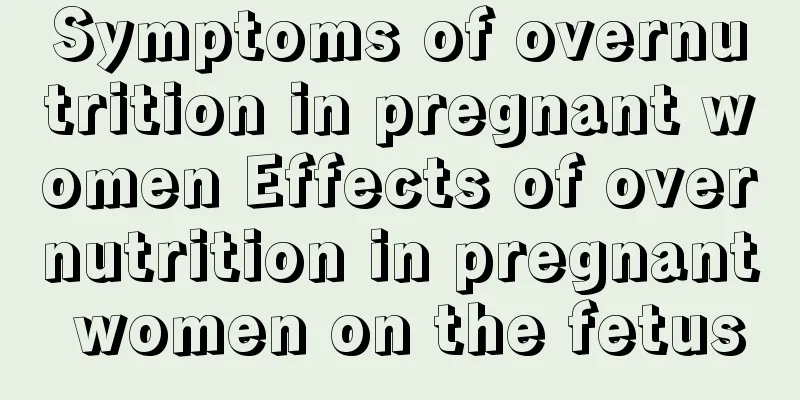Symptoms of overnutrition in pregnant women Effects of overnutrition in pregnant women on the fetus

|
The physical condition of a pregnant woman is very important, because the physical condition of a pregnant woman represents not only the state of herself but also the state of the baby in her belly. Today, let's learn about what happens when a pregnant woman has excessive nutrition. Symptoms of overnutrition in pregnant womenThe easiest thing to see is that there is a smell when pregnant women burp. Because pregnant women supplement too much nutrition and eat too much, they cannot digest completely for a while, and the food accumulates in the stomach. It is best to relieve the pressure in the stomach by burping. The burps will be more unpleasant, and the pregnant woman's stomach will be very uncomfortable. The second symptom is that excessive nutrition will cause high blood sugar. Because the food is not only nutritious, but also very sweet, it causes blood sugar to rise. If blood sugar is too high during pregnancy, it will have a negative impact on the development of the baby in the belly. Some pregnant women with excessive nutrition will have symptoms of constipation because they eat too much and the digestive system cannot bear it, so the digestive function is weakened, leading to constipation problems. Effects of excess nutrition in pregnant women on the fetus1. Excess nutrition caused by fruits can cause diabetes in pregnant women Most pregnant mothers believe that eating more fruits can effectively supplement vitamins and give birth to a baby with fair skin, so they eat fruits desperately during pregnancy. However, experts point out that this is one-sided and unscientific. Some fruits are very high in sugar. Excessive intake will lead to excessive sugar content in the diet during pregnancy, which may cause gestational diabetes. Overnutrition caused by nutrients can increase the risk of fetal malformations. 2. Pregnant women who eat too much fish, meat, eggs, etc. will increase the level of catecholamines and increase the risk of cleft palate and cleft lip in the fetus. In addition, pregnant women who eat too much animal liver will significantly increase the level of vitamin A in the body, which will affect the development of the fetal brain and heart, and even cause fetal genital malformations. Therefore, pregnant women should take in nutrition in moderation and should not eat too much or too full. 3. Overnutrition caused by folic acid can lead to zinc deficiency Supplementing folic acid can prevent fetal neural tube defects and help reduce the risk of gestational hyperlipidemia. However, folic acid should not be taken indiscriminately, as excessive intake may lead to fetal zinc deficiency, which can retard fetal growth and development. 4. Overnutrition caused by calories can lead to overweight mothers and babies If pregnant women consume too much staple food, the calories will exceed the standard, causing the mother to be overweight and the fetus to be too large. This may cause symptoms such as gestational diabetes and pregnancy-induced hypertension during pregnancy, which is not conducive to the growth and development of the fetus, and will increase the difficulty of delivery and may also lead to dystocia. In addition, giant babies are prone to diabetes and cardiovascular diseases when they grow up. What should pregnant women do if they have excess nutrition?The 13th to 27th week of pregnancy is a critical period for pregnant women to gain weight, and the weight of the fetus will also increase rapidly. During this period, pregnant women should strictly monitor their weight. If they find that their weight is increasing too quickly, they should pay more attention to their diet. Reduce the intake of high-calorie, high-fat foods. If you can stick to exercise, the effect will be better. In the late pregnancy, the fetus grows very fast, and the weight of pregnant women will also increase sharply. During this period, pregnant women can eat more fruits and reduce the intake of rice and noodles to avoid excessive weight gain for themselves and the fetus. How to judge whether pregnant women have overnutritionThe most convenient and commonly used indicator to determine whether a pregnant woman has excess nutrition is weight. Weigh yourself at least once a month during pregnancy. Under normal circumstances, the weight can increase by 1.1 to 1.5 kg in the first three months of pregnancy; after three months, the weight increases by 0.35 to 0.4 kg per week. By the time of full-term pregnancy, the weight increases by 10 to 12.5 kg compared to before pregnancy. If you are overweight, it means you have excess nutrition. |
<<: How many days of pregnancy can you detect early pregnancy symptoms
>>: What are the symptoms of early pregnancy and how to check whether you are pregnant
Recommend
How many days does it take for a baby to be weaned? What should I do if the baby cries in the middle of the night after being weaned?
Mothers who have given birth to babies know that ...
Can you get pregnant with a small amount of menstrual flow? The key is whether you can ovulate
Infrequent menstruation is a very common disease....
Can I brush my baby's teeth during the replacement period? Can I brush my child's teeth during the replacement period?
During the period of teeth replacement, babies wi...
How much weight is normal for a newborn baby to gain in one month?
Newborn babies usually weigh 5-8 catties. In the ...
What style of milk powder box is good? Advantages and disadvantages of different sizes
The first type of independent milk powder box is ...
How to give your child a nice name? What are some nice names with meaning?
Naming your child is an issue that many people ta...
If you want your baby to be healthy and happy, you can tell by looking at the baby's stool
Why do babies often have diarrhea? What is going ...
What age of baby is Comotomo bottle suitable for?
Comotomo is a milk bottle that is similar to brea...
Do you regret having only one child?
In the past, people only had one child under the ...
Why do children love to eat hair? Maybe they are losing too much zinc!
Love to eat strange things, such as biting nails,...
Can babies mix medicine with milk powder? How should babies take medicine?
When babies are young, they are weak and have poo...
What should pregnant women do if they have eye allergies? Here are 4 solutions
The eyes are a very fragile part, so we need to p...
How to preserve baby's hair and make it into a hair brush
After the baby's lanugo is shaved, the family...
What series of Bausch and Lomb contact lenses are there? What materials are Bausch and Lomb contact lenses made of?
Bausch and Lomb's contact lenses are quite fa...
Which country's brand is Omo from? Is Omo a Unilever?
Omo is a well-known brand and it is also a very o...









